主谓一致
图片预览
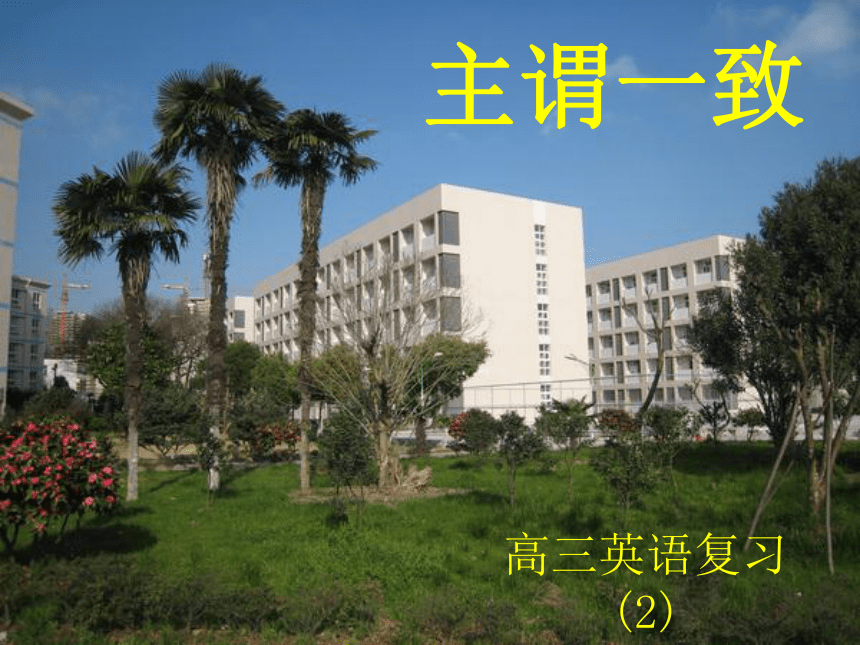
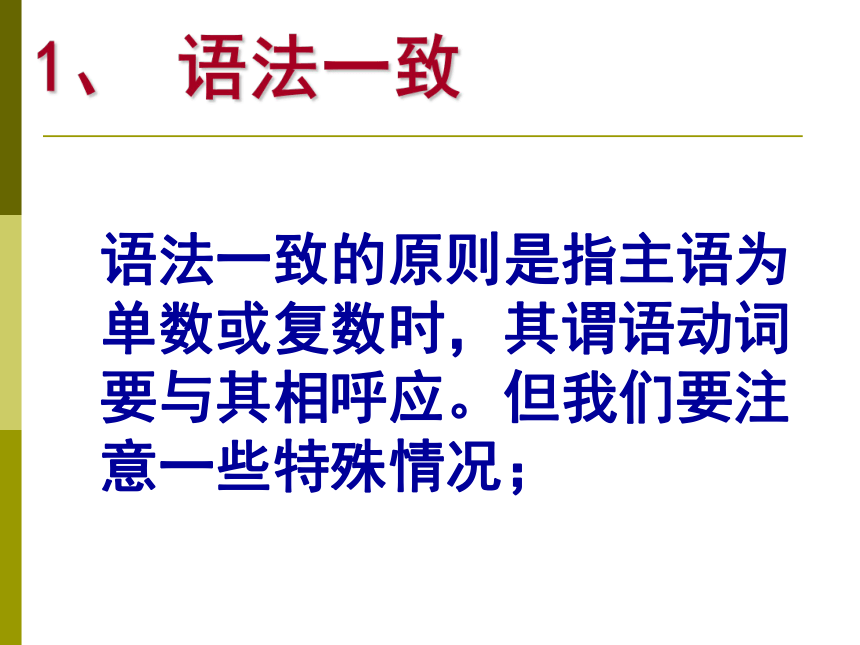
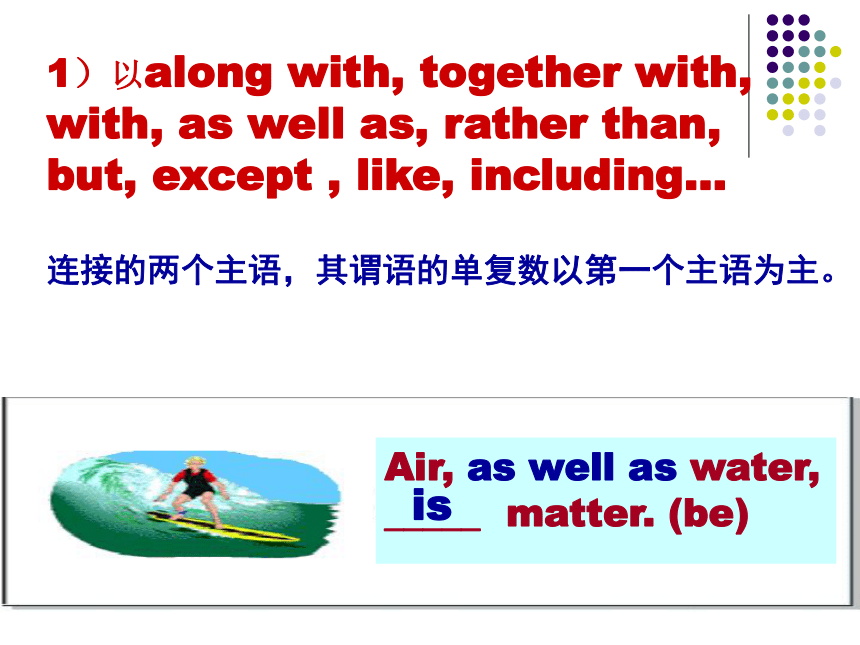
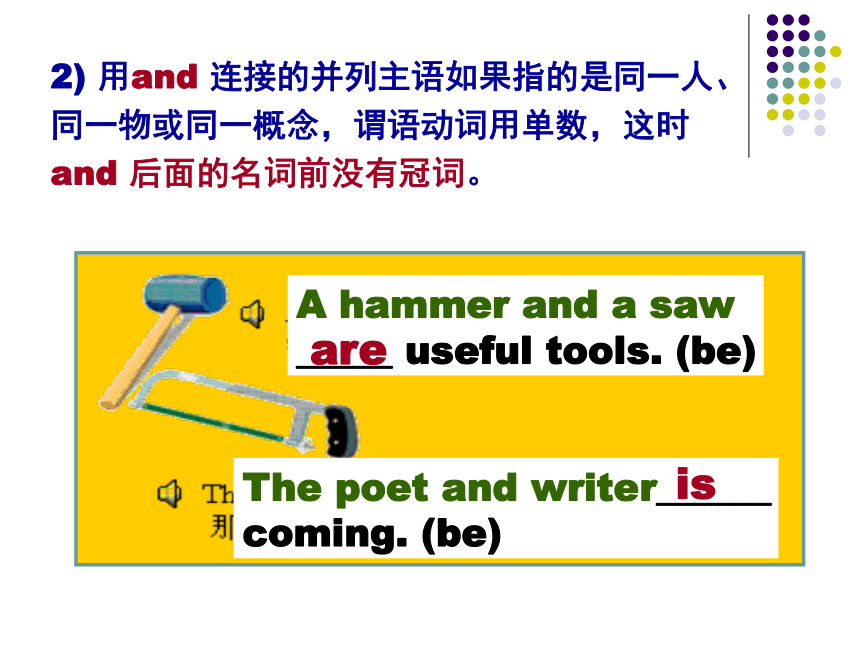
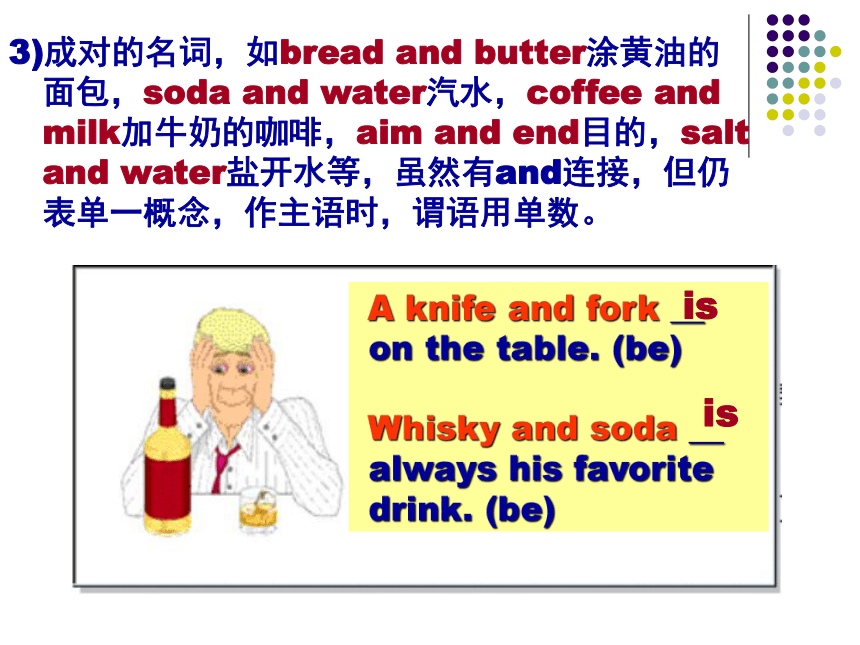
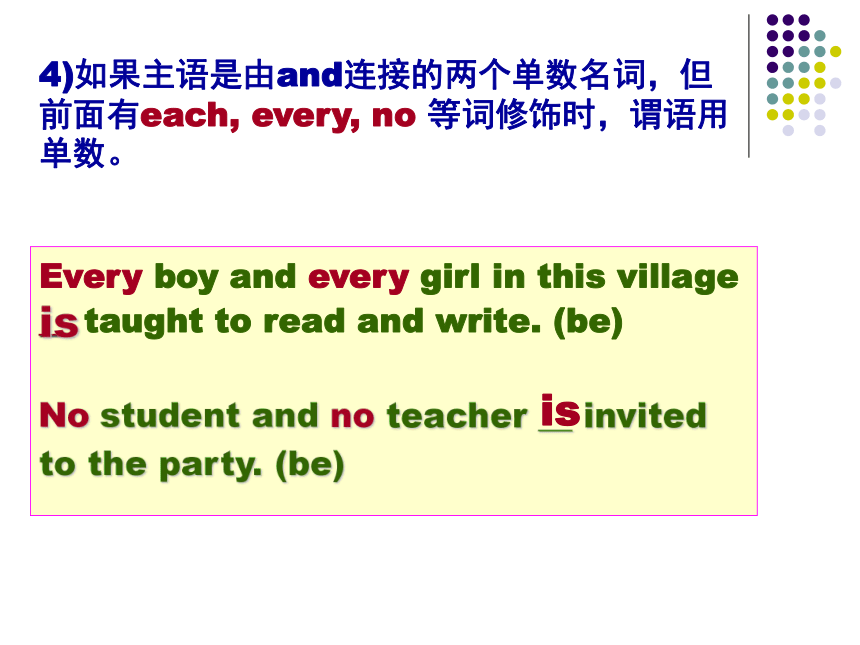
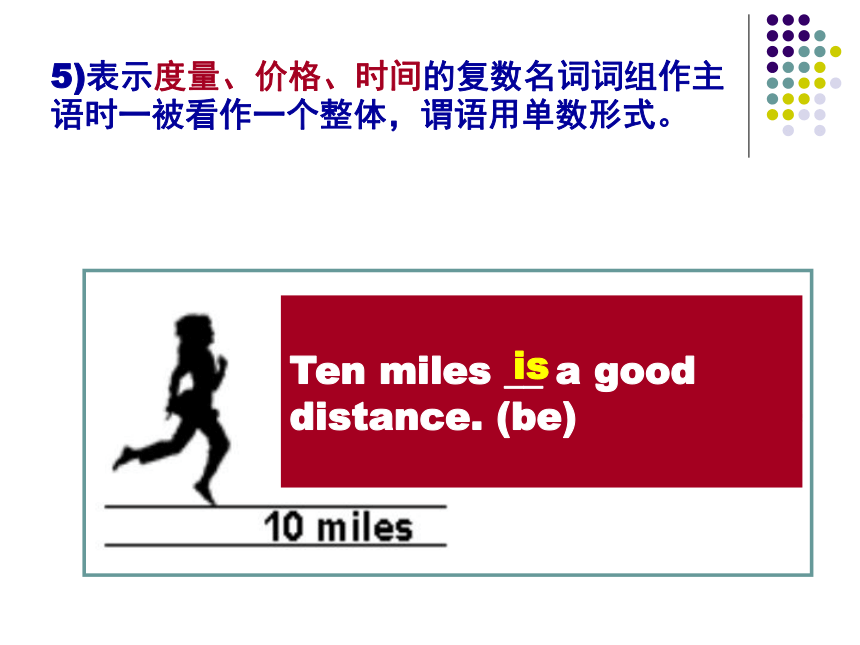
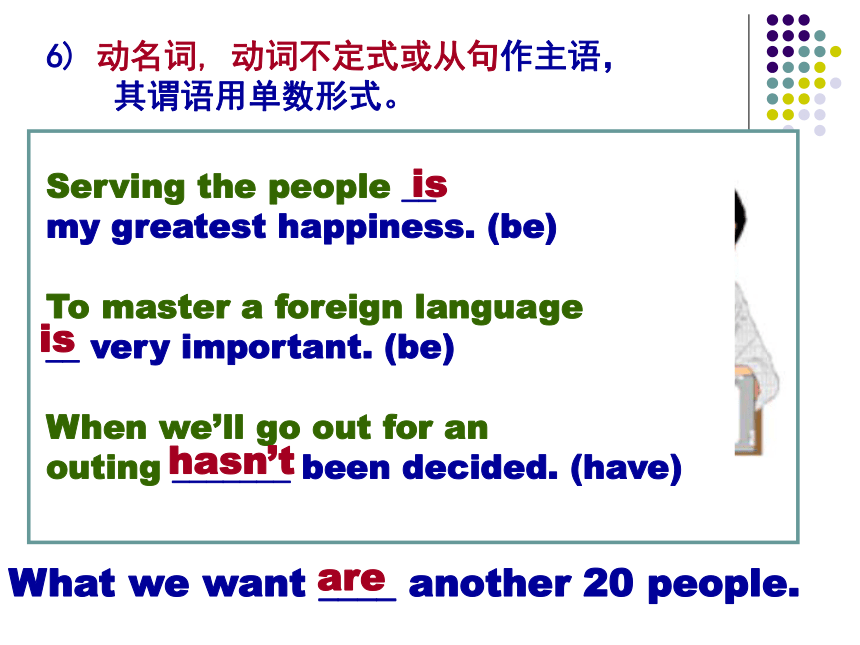
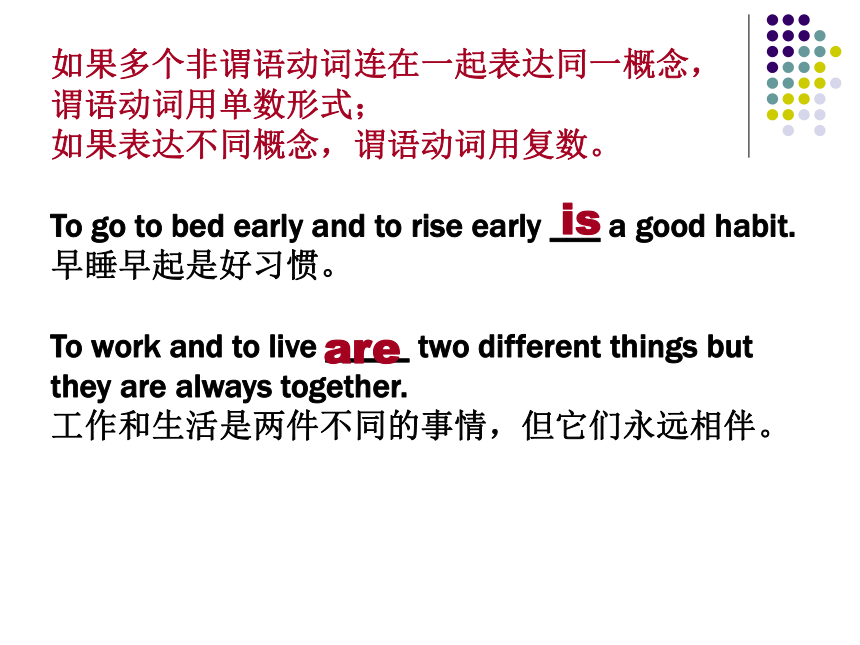
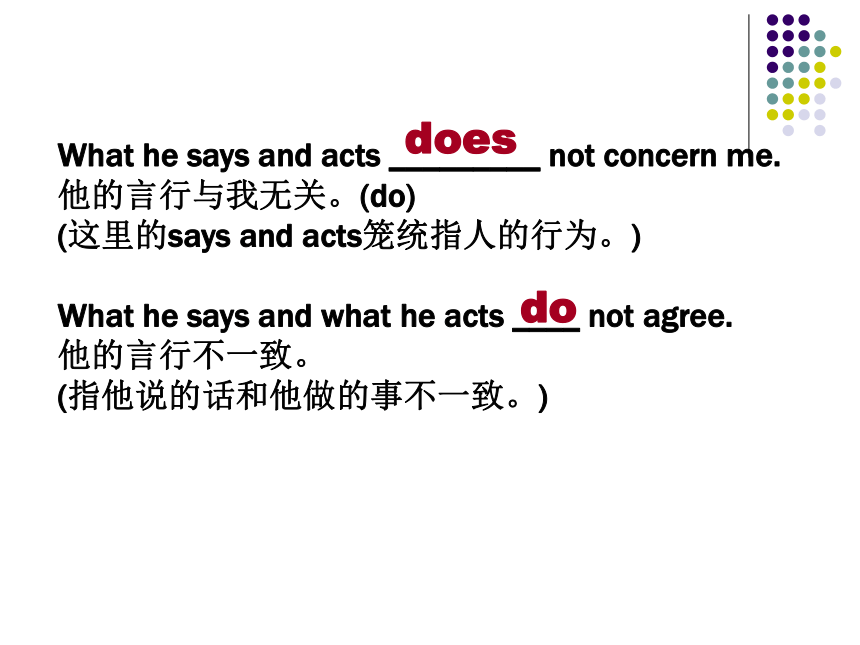
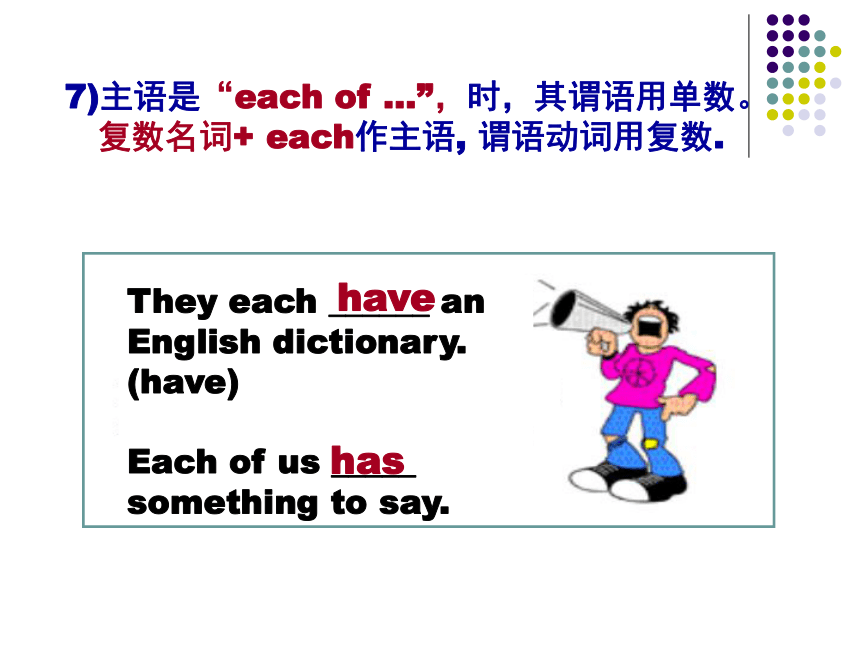
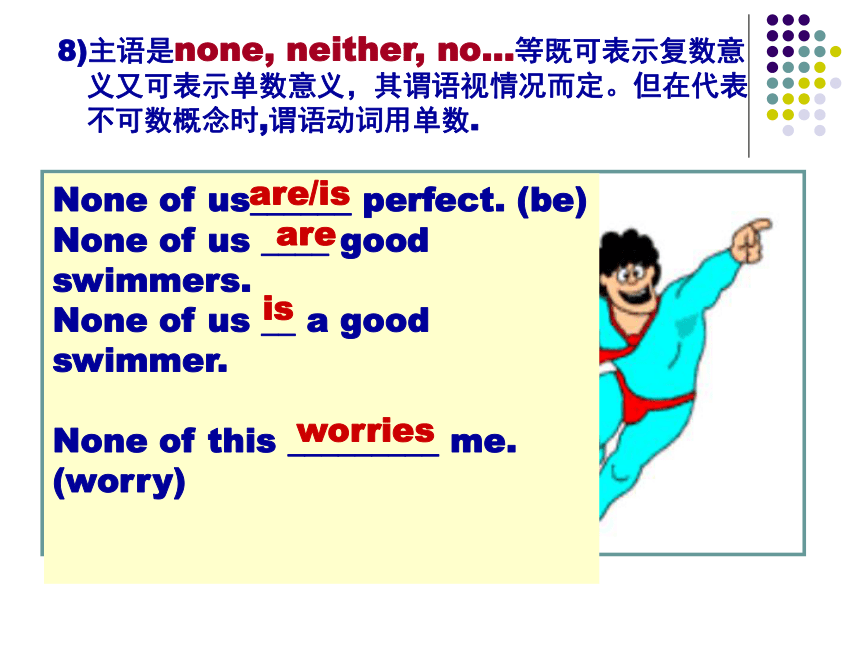
文档简介
课件35张PPT。主谓一致高三英语复习(2)1、 语法一致语法一致的原则是指主语为
单数或复数时,其谓语动词
要与其相呼应。但我们要注
意一些特殊情况;1)以along with, together with,
with, as well as, rather than,
but, except , like, including…
连接的两个主语,其谓语的单复数以第一个主语为主。is Air, as well as water,
_____ matter. (be)
is2) 用and 连接的并列主语如果指的是同一人、
同一物或同一概念,谓语动词用单数,这时
and 后面的名词前没有冠词。A hammer and a saw _____ useful tools. (be)areThe poet and writer______
coming. (be)is3)成对的名词,如bread and butter涂黄油的
面包,soda and water汽水,coffee and
milk加牛奶的咖啡,aim and end目的,salt
and water盐开水等,虽然有and连接,但仍
表单一概念,作主语时,谓语用单数。 A knife and fork __
on the table. (be)
Whisky and soda __
always his favorite
drink. (be)isis4)如果主语是由and连接的两个单数名词,但
前面有each, every, no 等词修饰时,谓语用
单数。Every boy and every girl in this village
__ taught to read and write. (be)
No student and no teacher __ invited
to the party. (be)
isis5)表示度量、价格、时间的复数名词词组作主
语时一被看作一个整体,谓语用单数形式。
Ten miles __ a good
distance. (be)
is6) 动名词, 动词不定式或从句作主语,
其谓语用单数形式。Serving the people __
my greatest happiness. (be)
To master a foreign language
__ very important. (be)
When we’ll go out for an
outing _______ been decided. (have)
isishasn’tWhat we want ____ another 20 people.are如果多个非谓语动词连在一起表达同一概念,
谓语动词用单数形式;
如果表达不同概念,谓语动词用复数。
To go to bed early and to rise early ___ a good habit.
早睡早起是好习惯。
To work and to live _____ two different things but
they are always together.
工作和生活是两件不同的事情,但它们永远相伴。isareWhat he says and acts _________ not concern me.
他的言行与我无关。(do)
(这里的says and acts笼统指人的行为。)
What he says and what he acts ____ not agree.
他的言行不一致。
(指他说的话和他做的事不一致。)doesdo7)主语是“each of …”,时,其谓语用单数。
复数名词+ each作主语, 谓语动词用复数.They each ______ an
English dictionary. (have)
Each of us _____
something to say.havehas8)主语是none, neither, no…等既可表示复数意
义又可表示单数意义,其谓语视情况而定。但在代表
不可数概念时,谓语动词用单数.None of us______ perfect. (be)
None of us ____ good
swimmers.
None of us __ a good
swimmer.
None of this _________ me.
(worry)
are/isareisworries9)不定代词all, more, most, any, 等以及名词
half, part, the rest等既可表示复数意义又可表示
单数意义,其谓语视情况而定。
Most of the apples
______ rotten.(be)Most of the apple
______ eaten.werewasall作主语,指人时谓语动词用复数,
指物时常用单数。
All ______ present besides the professor.
所有的人都出席,包括那位教授。
All _____ going on very well.
一切顺利areis1o)“a number of + 名词复数”作主语,谓语用复数;
“ the number of + 名词复数”作主语,谓语用单数。A number of pupils ____ reading
picture-books. (like)
The number of deer, lions and wild roses ______ not change much if people leave things as they are.(do)
doeslike11)“a quantity of + 可数名词复数”作主语,谓语用复数;
+ 不可数名词作主语,用单数
“ quantities of + 可数名词复数”作主语,谓语用复数
+不可数名词作主语,用复数A large quantity of books _____ needed there. (be)
A large quantity of food _____ needed there.
Quantities of books _____ needed there.
Quantities of food _____ needed there.areareareisa great deal (of),a little,a large amount (of)
等修饰不可数名词作主语其谓语动词只用单数形式。
A great deal of time _____ wasted playing but ought
to have been fully used. (be)
很多时间在玩耍中浪费掉了,但应该好好利用的。
A large amount of medicine ____ needed in the
stricken area.
灾区需要大量的药品。wasis12)“……的几分之几”和“……的百分之几”
作主语时,其谓语用单数或复数取决于
of 后的名词。Three-fourths of the
surface of the earth
__ sea. (be)40 percent of the students in our class ___ girls.
isare80% of the population here ______ farmers.are13)主语是表示数量的“one and a half
+复数名词”,其谓语用单数形式
One and a half bananas __ left on the
table.isone or two后接复数名词,谓语要用复数,
a/an+单数名词+or two结构之后,谓语却常用单数。
One or two days ______ enough for this work.
A day or two ____ enough for this work.
干这活一两天就够了。isareone in+基数词…”作主语:
一般情况下,“one in+基数词”或其修饰的名词
作主语,谓语动词用单数形式。
It is reported that in this area one in four people
___________ from lung cancer. (suffer)
据报道此地区有四分之一的人患有肺癌。suffers14) 由 many a 或 more than + 单数名词作
主语时,其谓语用单数形式。
Many a foreigner ____ been to the
Great Wall. (have)
More than one student ____ visited
the exhibition.
hashasMore members than one _____ against the proposal.
反对这项提议的会员不止一个。(be)are
I, who ____ your teacher, will teach
you everything I know. (be)She is the only one of these women
who _____ the violin. (play)amplays15) 在定语从句中主语是关系代词who, that, which,
谓语动词的数应与先行词的数一致。16) “one of + 复数名词 + 定语从句”之前有the only,
the very, the等限定词和修饰语时,定语从句的谓语动
词用单数形式。17)主语是a / this / that kind of +名词,
谓语与kind保持一致. 名词+ a / this / that
kind ,谓语与名词保持 一致。
This kind of cloth ______ soft. (feel)
There ______ different kinds of animals. (be)
This kind of actors______ easily found.
Actors of this kind _____ easily found.feelsareareis18) 两数相加、相乘:此时谓语动词可用单数也
可用复数形式。
两数相减、相除:此时谓语动词用单数。
15 minus 5 ____ equal to 10.
Five times four _______ twenty. is / areisSuch的倒装结构, 谓语动词的单复数
形式应根据其真正的住主语而定。
Such ___ Stephen Hawking,who has suffered
a great deal but achieved so much.
这就是史蒂芬·霍金,遭受着巨大的痛苦而作出伟大
成就的人。
Such ____ the difficulties that we are now
faced with.
这就是我们现在所面临的困难。
isare2、 意义一致的原则:指谓语动词的单复数取决于
主语所表达的概念,
而不取决于表面的语法标志. 类似这样的集体名词有:
family, class, audience,
committee (委员会), crowd, crew,
group, party, population, team,
public, council (理事会), village等。His family ___ all music lovers.
His family ___ very big( be)areis1)某些集体名词后可跟动词单数或复数。如果这些集
体名词指整体概念时,谓语动词用单数;指具
体成员时用复数。2)主语是一些只有复数形式的名词,如clothes,
trousers, glasses, compasses, scissors,
shoes, socks, gloves等时,谓语用复数。
但这类表示成双的东西的名词前有a pair of修饰时,谓语用单数。 My trousers ______ new;
There __ a pair of shoes in the box.areis表示国家、人民的名词作主语的情况:
有些以-sh,-ese,-ch结尾的表示国家、民族的
形容词与the连用时表示复数含义,谓语动词用复数。
The English ______ to be with their families
at Christmas. (like)
英国人喜欢在圣诞节与家人团聚。
The Chinese _____ a hard-working people.
中华民族是一个勤劳的民族。(be)
arelike Mathematics _______ to be difficult to learn. (seem)
A new means of teaching __ being used in that school. The United States __ a developed country. 注:学科名词前如有物主代词修饰时,谓语常用复数。My mathematics ___ weak.isseemsisare主语是以-ics 结尾的学科名词mathematics, politics,
physics以及news, works (工厂)和用作书名The
Arabian Nights、报纸名The new York Times
国名The United States等都属复数形式,而意义单数的名词,
其谓语用单数形式。另外means一词单复数同形应视
具体情况而定。3) the +形容词或分词作主语时,如指一类人。其谓语用
复数,如指抽象概念,其谓语用单数. The rich ___ not
always happy. (be)
The new __ sure to
replace the old.
areis3.就近一致
谓语与靠近的那个主语
保持一致.1) 由here, there, 引导的倒装句中.1)Here________ the bus. (come)
2)There __ a pen and
two books on the
table. (be)
comesis2) 由or, either…or, neither…nor,
not only…but also等连接的并列主语.1)Neither the students
nor the teacher ____
anything about it. (know)
2)He or you _____ taken my pen. (have)knowshave
单数或复数时,其谓语动词
要与其相呼应。但我们要注
意一些特殊情况;1)以along with, together with,
with, as well as, rather than,
but, except , like, including…
连接的两个主语,其谓语的单复数以第一个主语为主。is Air, as well as water,
_____ matter. (be)
is2) 用and 连接的并列主语如果指的是同一人、
同一物或同一概念,谓语动词用单数,这时
and 后面的名词前没有冠词。A hammer and a saw _____ useful tools. (be)areThe poet and writer______
coming. (be)is3)成对的名词,如bread and butter涂黄油的
面包,soda and water汽水,coffee and
milk加牛奶的咖啡,aim and end目的,salt
and water盐开水等,虽然有and连接,但仍
表单一概念,作主语时,谓语用单数。 A knife and fork __
on the table. (be)
Whisky and soda __
always his favorite
drink. (be)isis4)如果主语是由and连接的两个单数名词,但
前面有each, every, no 等词修饰时,谓语用
单数。Every boy and every girl in this village
__ taught to read and write. (be)
No student and no teacher __ invited
to the party. (be)
isis5)表示度量、价格、时间的复数名词词组作主
语时一被看作一个整体,谓语用单数形式。
Ten miles __ a good
distance. (be)
is6) 动名词, 动词不定式或从句作主语,
其谓语用单数形式。Serving the people __
my greatest happiness. (be)
To master a foreign language
__ very important. (be)
When we’ll go out for an
outing _______ been decided. (have)
isishasn’tWhat we want ____ another 20 people.are如果多个非谓语动词连在一起表达同一概念,
谓语动词用单数形式;
如果表达不同概念,谓语动词用复数。
To go to bed early and to rise early ___ a good habit.
早睡早起是好习惯。
To work and to live _____ two different things but
they are always together.
工作和生活是两件不同的事情,但它们永远相伴。isareWhat he says and acts _________ not concern me.
他的言行与我无关。(do)
(这里的says and acts笼统指人的行为。)
What he says and what he acts ____ not agree.
他的言行不一致。
(指他说的话和他做的事不一致。)doesdo7)主语是“each of …”,时,其谓语用单数。
复数名词+ each作主语, 谓语动词用复数.They each ______ an
English dictionary. (have)
Each of us _____
something to say.havehas8)主语是none, neither, no…等既可表示复数意
义又可表示单数意义,其谓语视情况而定。但在代表
不可数概念时,谓语动词用单数.None of us______ perfect. (be)
None of us ____ good
swimmers.
None of us __ a good
swimmer.
None of this _________ me.
(worry)
are/isareisworries9)不定代词all, more, most, any, 等以及名词
half, part, the rest等既可表示复数意义又可表示
单数意义,其谓语视情况而定。
Most of the apples
______ rotten.(be)Most of the apple
______ eaten.werewasall作主语,指人时谓语动词用复数,
指物时常用单数。
All ______ present besides the professor.
所有的人都出席,包括那位教授。
All _____ going on very well.
一切顺利areis1o)“a number of + 名词复数”作主语,谓语用复数;
“ the number of + 名词复数”作主语,谓语用单数。A number of pupils ____ reading
picture-books. (like)
The number of deer, lions and wild roses ______ not change much if people leave things as they are.(do)
doeslike11)“a quantity of + 可数名词复数”作主语,谓语用复数;
+ 不可数名词作主语,用单数
“ quantities of + 可数名词复数”作主语,谓语用复数
+不可数名词作主语,用复数A large quantity of books _____ needed there. (be)
A large quantity of food _____ needed there.
Quantities of books _____ needed there.
Quantities of food _____ needed there.areareareisa great deal (of),a little,a large amount (of)
等修饰不可数名词作主语其谓语动词只用单数形式。
A great deal of time _____ wasted playing but ought
to have been fully used. (be)
很多时间在玩耍中浪费掉了,但应该好好利用的。
A large amount of medicine ____ needed in the
stricken area.
灾区需要大量的药品。wasis12)“……的几分之几”和“……的百分之几”
作主语时,其谓语用单数或复数取决于
of 后的名词。Three-fourths of the
surface of the earth
__ sea. (be)40 percent of the students in our class ___ girls.
isare80% of the population here ______ farmers.are13)主语是表示数量的“one and a half
+复数名词”,其谓语用单数形式
One and a half bananas __ left on the
table.isone or two后接复数名词,谓语要用复数,
a/an+单数名词+or two结构之后,谓语却常用单数。
One or two days ______ enough for this work.
A day or two ____ enough for this work.
干这活一两天就够了。isareone in+基数词…”作主语:
一般情况下,“one in+基数词”或其修饰的名词
作主语,谓语动词用单数形式。
It is reported that in this area one in four people
___________ from lung cancer. (suffer)
据报道此地区有四分之一的人患有肺癌。suffers14) 由 many a 或 more than + 单数名词作
主语时,其谓语用单数形式。
Many a foreigner ____ been to the
Great Wall. (have)
More than one student ____ visited
the exhibition.
hashasMore members than one _____ against the proposal.
反对这项提议的会员不止一个。(be)are
I, who ____ your teacher, will teach
you everything I know. (be)She is the only one of these women
who _____ the violin. (play)amplays15) 在定语从句中主语是关系代词who, that, which,
谓语动词的数应与先行词的数一致。16) “one of + 复数名词 + 定语从句”之前有the only,
the very, the等限定词和修饰语时,定语从句的谓语动
词用单数形式。17)主语是a / this / that kind of +名词,
谓语与kind保持一致. 名词+ a / this / that
kind ,谓语与名词保持 一致。
This kind of cloth ______ soft. (feel)
There ______ different kinds of animals. (be)
This kind of actors______ easily found.
Actors of this kind _____ easily found.feelsareareis18) 两数相加、相乘:此时谓语动词可用单数也
可用复数形式。
两数相减、相除:此时谓语动词用单数。
15 minus 5 ____ equal to 10.
Five times four _______ twenty. is / areisSuch的倒装结构, 谓语动词的单复数
形式应根据其真正的住主语而定。
Such ___ Stephen Hawking,who has suffered
a great deal but achieved so much.
这就是史蒂芬·霍金,遭受着巨大的痛苦而作出伟大
成就的人。
Such ____ the difficulties that we are now
faced with.
这就是我们现在所面临的困难。
isare2、 意义一致的原则:指谓语动词的单复数取决于
主语所表达的概念,
而不取决于表面的语法标志. 类似这样的集体名词有:
family, class, audience,
committee (委员会), crowd, crew,
group, party, population, team,
public, council (理事会), village等。His family ___ all music lovers.
His family ___ very big( be)areis1)某些集体名词后可跟动词单数或复数。如果这些集
体名词指整体概念时,谓语动词用单数;指具
体成员时用复数。2)主语是一些只有复数形式的名词,如clothes,
trousers, glasses, compasses, scissors,
shoes, socks, gloves等时,谓语用复数。
但这类表示成双的东西的名词前有a pair of修饰时,谓语用单数。 My trousers ______ new;
There __ a pair of shoes in the box.areis表示国家、人民的名词作主语的情况:
有些以-sh,-ese,-ch结尾的表示国家、民族的
形容词与the连用时表示复数含义,谓语动词用复数。
The English ______ to be with their families
at Christmas. (like)
英国人喜欢在圣诞节与家人团聚。
The Chinese _____ a hard-working people.
中华民族是一个勤劳的民族。(be)
arelike Mathematics _______ to be difficult to learn. (seem)
A new means of teaching __ being used in that school. The United States __ a developed country. 注:学科名词前如有物主代词修饰时,谓语常用复数。My mathematics ___ weak.isseemsisare主语是以-ics 结尾的学科名词mathematics, politics,
physics以及news, works (工厂)和用作书名The
Arabian Nights、报纸名The new York Times
国名The United States等都属复数形式,而意义单数的名词,
其谓语用单数形式。另外means一词单复数同形应视
具体情况而定。3) the +形容词或分词作主语时,如指一类人。其谓语用
复数,如指抽象概念,其谓语用单数. The rich ___ not
always happy. (be)
The new __ sure to
replace the old.
areis3.就近一致
谓语与靠近的那个主语
保持一致.1) 由here, there, 引导的倒装句中.1)Here________ the bus. (come)
2)There __ a pen and
two books on the
table. (be)
comesis2) 由or, either…or, neither…nor,
not only…but also等连接的并列主语.1)Neither the students
nor the teacher ____
anything about it. (know)
2)He or you _____ taken my pen. (have)knowshave
